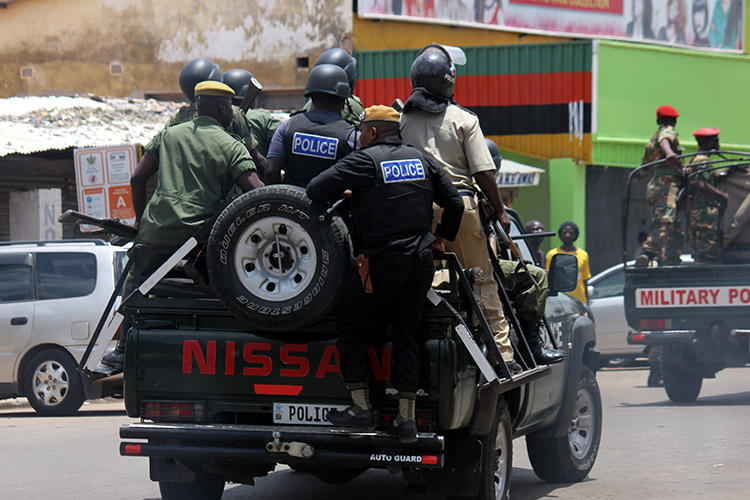New York, April 13, 2020 — Zambian authorities should restore Prime TVs broadcast license and cease harassing the outlet, the Committee to Protect Journalists said today.
On April 9, the Independent Broadcasting Authority, Zambia’s broadcasting regulator, cancelled Prime TV’s license “in the interest of public safety, security, peace, welfare or good order,” according to a statement from the regulator, which CPJ reviewed. The statement said that Prime TV must surrender its license and cease broadcasting immediately. It did not specify any broadcasts or actions by the station’s employees that prompted the decision.
On the same day, police arrived at the outlet’s office in Lusaka, the capital, and forced staffers to leave the building and barred them from returning, according to a person with knowledge of the matter, who said that employees had not been able to return as of today.
Prime TV, a popular television station known for its critical coverage of the government, had recently been covering the COVID-19 pandemic, according to that person, who spoke to CPJ on the condition of anonymity because they were not authorized to speak to media. Prime TV had also covered the Bill 10 constitutional amendment under consideration by parliament, which detractors allege will keep the ruling Patriotic Front party in power indefinitely, according to news reports.
Last year, authorities suspended Prime TV’s license for 30 days for alleged unprofessionalism in response to a complaint lodged by the Patriotic Front, as CPJ documented at the time.
“The Zambian public needs credible information about the COVID-19 pandemic and other events in the public interest. Now is not the time for Information Minister Dora Siliya to retaliate against a popular private outlet that does not toe the government line,” said Angela Quintal, CPJ’s Africa program coordinator. “The Independent Broadcasting Authority should immediately reinstate Prime TV’s broadcasting license, and authorities should allow the broadcaster to reopen and resume covering the news.”
The broadcaster’s suspension followed a month of heightened tensions between the government and Prime TV.
On March 13, Prime TV owner Gerald Shawa, in his capacity as chairman of the Zambia Independent Media Association, a local trade group, told officials that independent outlets were not prepared to air the government’s coronavirus-awareness campaign for free, because the government owed them money for airing previous advertisements and, unlike the public broadcaster, they were not subsidized by the state, according to media reports.
On March 17, Information and Broadcasting Services Minister Dora Siliya accused Prime TV of being “unpatriotic” and banned government officials from conducting any business with it, including appearing on its broadcasts, and also barred the network’s journalists from attending official events, according to local media reports and a copy of Siliya’s press release seen by CPJ.
On March 27, Top Star Communication Limited Company, a partly state-owned television signal carrier, informed Prime TV that it would stop carrying its broadcasts, according to news reports and documents from a complaint that Prime TV filed to the Lusaka High Court on April 1, which CPJ reviewed.
Prime TV continued broadcasting on other signal carriers from March 27 until April 9, when its license was cancelled, according to a person with knowledge of the matter who asked not to be named for fear of retaliation.
The Law Association of Zambia, an independent professional body, expressed concern about the license cancellation, stating that it had been conducted prematurely without following the law, according to an April 11 statement from the group, which CPJ reviewed, and news reports.
The statement said that authorities’ retaliation against Prime TV “raises a lot of speculation and reasonable doubts about the professionalism of the [Independent Broadcasting Authority] in this matter.”
The statement also expressed alarm over the fact that Zambian police had taken control of an outlet’s premises “without a court order or any evidence of criminal activities perpetrated by Prime TV.” The Independent Broadcasting Authority statement did not say that the outlets’ facilities would be evacuated and closed.
Another person familiar with the case, who asked not be named for fear of reprisal, said that the revocation of Prime TV’s broadcast license “confirmed that the government’s aim is simply to silence a key independent media house that has at times been critical of the government’s stance on governance issues.”
Independent Broadcasting Authority Director-General Josephine Mapoma told CPJ via messaging app that the board had cancelled the license in the public interest and had no obligation to give examples of the outlet’s coverage prompting the decision. She added that news about COVID-19 was still being broadcast on TV and radio stations throughout the country.
When contacted via messaging app, Information Permanent Secretary Amos Malupenga declined to comment and referred CPJ to Siliya. The minister did not reply to CPJ’s emailed questions on Friday or a text message today.
[Editors’ Note: This article has been corrected in its fourth paragraph to reflect that Bill 10’s status in parliament.]
